Showing posts with label writing. Show all posts
Showing posts with label writing. Show all posts
November 18, 2014
Slice of Life Tuesday: Did You Volunteer For This??
Call me crazy, but I sort of love arriving at school an hour before class begins. Not because I can get so much extra work done in those quiet hours before students are trouncing through every nook and cranny in the building. Nope. I love this extra time because I get to spend it with young writers every day.
NaNoWriMo is in full swing, and for me that means a month-long writing club that meets every morning to write, share, and grow our writing community. This is one of the biggest years for our little community so far -- right at 25 fourth and fifth grade students come to school early every day to work on novels they chose to write.
Honestly, it's pretty amazing. There isn't much that can touch this experience in the awesomeness factor for me for the rest of the school year. Even so, I always get many questions about why I do this. And how.
"Did you volunteer for this??"
"Every day?"
"You show up how early??"
"How do you get them to keep coming back?"
"They just ... write?"
"Wait. So they actually sit down and write?!"
"Wow, I bet you can't wait for November to end!"
The truth is actually simple, and maybe a little bit boring. (Though here is an easy-to-use wikispace we've been testing out this year, heaped with writing tips for the beginning novel writer!)
I don't make this happen. They do.
I invite them, give them a place to hang out, and talk to them about their story ideas. I give them space to do something they love. They show up. They do the work.
We all respect each other's writing. We celebrate every word that goes down on paper; whether it's word one or five thousand. They set their own word goal and write until their little hands cramp up to meet those goals. They write in their spare time. They write at lunch. They write over the weekend.
They do the thing that all writers must do: they write.
Beginning every morning surrounded by these energetic young writers that are having fun and cheering each other on? That's easy.
The hard part is getting used to not having their smiling faces and wondrous words filling up my space each morning when November ends. Thank goodness for December's Revision Club!
June 27, 2014
Who Would've Thought
I've undertaken a lot this summer. The largest being a month long commitment to writing. I was graciously asked to apply to, and then accepted, into North Star of Texas Writing Project's Summer Institute. My co-ninja, Kelly, has been a part of NSTWP for years now and she has been after me for at least as long to accept writing as "good and not evil". I was positive that it was just not part of who I was. But it happened, she was finally able to brainwash me into feeling the need to go and become a part of this Writing Project.
I went.
Begrudgingly.
Dragging my hypothetical feet like an insolent brat.
I complained most of the first week, or maybe it was two weeks.
So don't tell her that I am actually enjoying it. I knew I would learn a lot, but I never in my wildest ideas thought I would end up thinking like a writer. I am the READING NINJA for Pete's sake!
But alas, I have been cursed with now having the brain of a writer. I can't see something odd or unusual and not think "Oh! I should write this down!" or "That comment would make a great blog post." (I am looking forward to writing about my experience this morning while at the hair salon!) Most of those will end up on my personal blog, due to my "adult" sense of humor. No matter; the fact is, it now seems that I must keep track of everything because I might want to write about it someday. I am constantly writing intros and hooks in my head, seeing how it sounds, for days or weeks before I get it on paper.
I've been listening to David Sedaris's newest book on my iPhone as I drive the hour and a half north to get to these classes. He writes little personal vignettes about things he's seen or noticed. Most of them are small, but then he connects them to another event in his childhood or to when he was a young adult. I think he's hilarious, and as I was writing the other day I noticed I was modeling my writing after his. My own mentor text. Hmmm - who knew I'd someday think like a writer? Ok - who besides Kelly.
I went.
Begrudgingly.
Dragging my hypothetical feet like an insolent brat.
I complained most of the first week, or maybe it was two weeks.
So don't tell her that I am actually enjoying it. I knew I would learn a lot, but I never in my wildest ideas thought I would end up thinking like a writer. I am the READING NINJA for Pete's sake!
But alas, I have been cursed with now having the brain of a writer. I can't see something odd or unusual and not think "Oh! I should write this down!" or "That comment would make a great blog post." (I am looking forward to writing about my experience this morning while at the hair salon!) Most of those will end up on my personal blog, due to my "adult" sense of humor. No matter; the fact is, it now seems that I must keep track of everything because I might want to write about it someday. I am constantly writing intros and hooks in my head, seeing how it sounds, for days or weeks before I get it on paper.
I've been listening to David Sedaris's newest book on my iPhone as I drive the hour and a half north to get to these classes. He writes little personal vignettes about things he's seen or noticed. Most of them are small, but then he connects them to another event in his childhood or to when he was a young adult. I think he's hilarious, and as I was writing the other day I noticed I was modeling my writing after his. My own mentor text. Hmmm - who knew I'd someday think like a writer? Ok - who besides Kelly.
November 21, 2013
5 Reasons To Use Evernote When Conferring With Students - NCTE13
Well, friends, with Evernote you can....
1. Organize your thoughts with purposeful tags: I don't know about you, but helping students grow their writing skill is not the only thing I have going on in my classroom -- or my life. Don't get me wrong, I love speaking with young writers about their work. But keeping everything straight in my head is not easy. I need to be able to quickly assess who I need to conference with and what piece they were working on last. Evernote has definitely come through to help.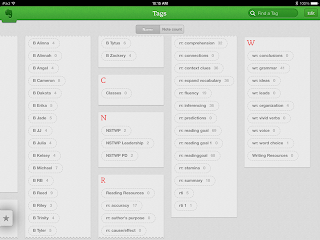.PNG) |
| Some of the Reading and Writing tags I used last year. |
2. Use notebooks to categorize large groups of notes: I work with more than one group of students, especially now that I am in the library. Instead of having a huge pile of notes all jumbled together, I've found that it helps me to create a tag for each student that matches the notebook I keep all their data in. This way, I can look at the whole group as well. Whether it is a writing club, classroom, tutorial group, or even a teacher writing group -- everything has a place!
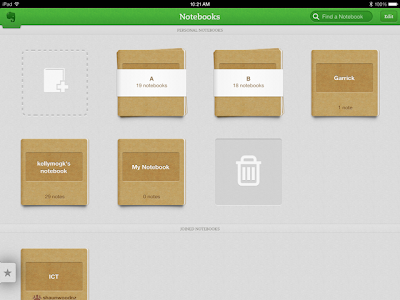 |
| Group A and B are classroom notebooks |
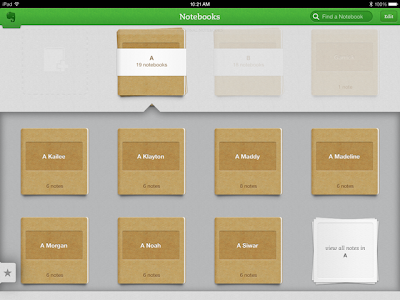 |
| Inside each notebook "stack" is a notebook for each student with the same tag. |
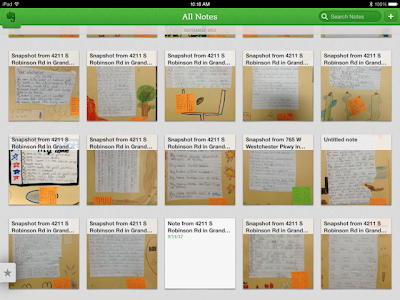 |
| Student work showing my sticky note feedback. |
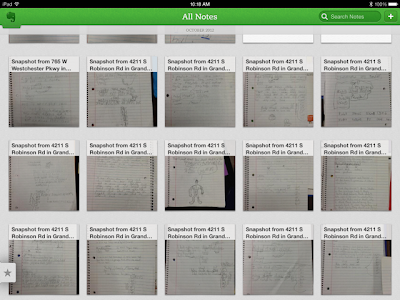 |
| Photos of response to reading of The One and Only Ivan |
 |
| Russ Goerend's site was the first I used to start my Evernote journey! |
 |
| The Together Teacher on Evernote as a conferring tool |
November 20, 2013
Conferring with Inquiry in Mind - #NCTE13
I love the way my peers in The North Star of Texas Writing Project challenge me to think deeply about the decisions I make when working with young writers. Here is the thinking I've been sifting through about conferencing with students:
 |
What?
I believe student conferences are the heart of writing workshop, but how do I guide conversations to encourage student growth without doing the work for them or squashing the young writer’s voice or desire to write? There is a Don Murray quote in Write Beside Them that embodies my goals when conferencing with a writer: “you should always leave a conference excited to get back to the writing.” I want to create contagious enthusiasm in an environment that encourages writers to take joy in the risk of playing boldly with their craft.
So what?
Lucy Calkins said, “Helping [students] take themselves seriously is crucial for them as writers and as maturing human beings.” I believe daily modeling through mentor texts helps students identify what works in a piece of writing, which is essential to scaffolding their ability to discover both what works and does not work in their own writing. Mentor texts and conferencing work hand in hand. I also know a student’s decision to share their writing heart with me is dependent on how I treat them -- as a person and as a writer. Don Murray said, “I must create a climate in the writing conference in which students can hear what they have to say so they can learn to listen to their own writing.” I must be purposeful in my planning and my words each time I work with a writer.
Now what?
I invite writers to share their work with me, and sometimes offer to read back their writing to them. This seems to help them hear their writing as their audience will receive it, and gives them the opportunity to write down what they notice about their own work. I’m learning to wait on writers when they are contemplating what their writing needs. My silence gives them space to think, and my “I notice” and “I wonder” statements help them look for their own answers, building their writing confidence. Research shows that writers grow best from receiving feedback, not evaluation. In fact, in The Essential Don Murray, he states it so eloquently :
"How do you motivate your student to pass through this process, perhaps even pass through it again and again on the same piece of writing?
First, by shutting up. When you are talking, he isn't writing."So my job during a writing conference is not to correct or change their work, but to listen and guide through gentle feedback and the silence that allows self reflection. I praise what has worked, and invite them to experiment with these techniques in other ways.
Takeaway:
As a writing partner, it’s my job to be prepared when we sit down together. In this way, I show respect for the writer and their work. This means knowing where my learners are in their writing journey. I need strong organization and notes on each writer. I have found Evernote to be indispensable tool helping me efficiently organize my conference notes. By creating folders for each student, I can tag their work and include photos, my own conference notes, and audio files on the work we do together. This also allows me to keep a digital writing portfolio on each writer to share with parents, in data meetings, and for the student to reflect on their work throughout the year.
Labels:
choice,
choice words,
conferencing,
conferring,
conversations,
dialogue,
manifesto,
mentortext,
NCTE13,
North Star of Texas Writing Project,
NSTWP,
NWP,
reflections,
student writing,
writing
November 16, 2013
The Art of Conversation - #NCTE13
Our students need a champion.
They come to us so often with voices screaming in their head, "I can't," after a lifetime of teachers and tests whispering try harder in their ears. And if you think a lifetime sounds like an exaggeration, consider the struggling readers and writers that have been trying harder since they were just four years old. When I first meet my young learners, they have been trying harder for half their lives, or more.
Young writers have a voice. They were born with it. Brilliant, beautiful, true words that sing of who they have been, who they are, and who they want to be. Somehow along the way - struggling through family issues, peer pressure, test trauma - they become detached from what is meant to be natural.
Young writers have a voice. They were born with it. Brilliant, beautiful, true words that sing of who they have been, who they are, and who they want to be. Somehow along the way - struggling through family issues, peer pressure, test trauma - they become detached from what is meant to be natural.
After all, we've been telling stories since time began.
I say to my students, my young readers and writers: "It's your story. Who better than you to tell it? Who better than you to know the perfect words to shout your story from the mountains? Who better than you to share your genius with the world?"
They already have the story. It's our job to light up the path, to put the tools in their hands and cheer them on, to be there when they need reassurance, saying, "Now, go forward. Be brave. You've had it in you all along."
| Photo taken during a North Star of Texas Writing Project Teacher Training session |
When we step into a classroom, sit alongside our students, and invite them to share their writing, we have important choices to make. We can become either their greatest champion or an unknowing saboteur of their voice and desire to learn.
When I sit down with struggling writers to discuss a piece of writing, I first ask them to read the piece to me. Often I find that they tell me the idea of the story instead of reading the actual words on the page. When this happens, I ask if they mind if I read it to them, exactly as it is written. I suggest that they listen to hear if the story I read is what they feel like they have written. I ask them to listen like a reader, noticing what they love and what doesn't work for them. They've done this before with mentor texts I've shared in class, so adapting this skill to their own writing isn't difficult.
Almost always, they are magnificent at discovering exactly the things I noticed when I first listened to them read. They are the drivers in these conferences. I am merely there to help navigate the path. We go over their list, and I praise both what they have done well as a writer and as a reader -- their ability to notice is a key to improvement. When I help students hear how their audience will experience their story, their perception of their work changes, and they are open to experimenting with revision. They want their message understood with the same passion and enthusiasm they feel for it, so the work of revision becomes an authentic means to reach their goal.
Although I feel there is no magic formula for the perfect conference -- conferring with students, much like writing, is an art -- my conversations with writers do have some common elements. Here you will see my inspiration comes from the teachings of Donald Murray, Lucy Calkins, Donald Graves, Penny Kittle, Mark Overmeyer, Ruth Ayers, and countless other masters of writing instruction, so I've tried to share some links that point to their work, along with my thoughts on what makes a successful writing conference:
Almost always, they are magnificent at discovering exactly the things I noticed when I first listened to them read. They are the drivers in these conferences. I am merely there to help navigate the path. We go over their list, and I praise both what they have done well as a writer and as a reader -- their ability to notice is a key to improvement. When I help students hear how their audience will experience their story, their perception of their work changes, and they are open to experimenting with revision. They want their message understood with the same passion and enthusiasm they feel for it, so the work of revision becomes an authentic means to reach their goal.
 |
| Conferring with young writer during a Saturday Writing Camp |
- Community: we write and share as a group every day, playing with words and celebrating one another for having the bravery simply to explore our craft.
- Listen - what is the message you are trying to share with your audience? What is the truest sense of the story you want to tell?
- Notice - elements in the writing that work, and places that make the reader stumble.
- Wonder - guide the process, wherever the writer is at, asking questions like, "I wonder what this piece would be like if..."
- Wait - give writers time to think, don't jump in to solve their problems for them, choose words sparingly - don't be afraid of silence.
But mostly, I follow my heart. I speak with my young writers the same way I would want anyone to speak with me about my writing: gently, with great compassion, and a desire to help. In this way, I am able to help them build trust. Not simply trust in me as a teacher -- that isn't enough to sustain their growth as writers. These conversations build the trust they have in their own abilities. Each word I choose is specific to the writer and focused on what they do well. By modeling these conversations daily through our conferences, they are able to read closely for themselves when working alone or when revising with a peer. Our classroom becomes a space open to respectful conversations focused on growing every writer to their full potential.
Labels:
#nerdywriterclub,
choice words,
conferencing,
conferring,
conversations,
dialogue,
mentortext,
NCTE13,
North Star of Texas Writing Project,
NSTWP,
NWP,
reflections,
student writing,
writing
January 28, 2013
Hold Fast to Your Professional Learning Network
Quite often this year I've found myself feeling a bit like an island marooned out somewhere just beyond the Bermuda Triangle and the Twilight Zone.
I know, I've talked about this before.
I'm so sad, I've said.
All these procedures are so different, I've groaned.
Nobody understands my pain, I've wailed.
And on and on. I know. Change is hard. But change without adequate support is akin to emotional amputation.
So what has made a difference for me in the last six months?
I know, I've talked about this before.
I'm so sad, I've said.
All these procedures are so different, I've groaned.
Nobody understands my pain, I've wailed.
And on and on. I know. Change is hard. But change without adequate support is akin to emotional amputation.
So what has made a difference for me in the last six months?
- A dear friend whose timely phone calls and text messages keep the embers burning. (Thank you, Jenny. I'm positive I wouldn't have made it this far without you.)
- The professional network of friends I meet with throughout the year as we collaborate and plan together. My friends in my local NWP site, the North Star of Texas Writing Project, inspire me to grow more, know more, and do more all the time. (Thank you Carol, Joan, Dr. P, Amanda, Audrey, Heather, Janelle, Amy, and all the many other movers and shakers that keep me on my toes!)
- Twitter. Oh yes, you heard me right -- Twitter is one of the best things that has happened for my professional development. I urge every teacher I know to test it out -- it's not just celebrity brawls and teenage angst, I promise. (I would not be the teacher I am today without the ability to peek into the minds of educators such as @dogtrax, @donalynbooks, @teachingwthsoul, @TechNinjaTodd and @AngelaMaiers, to name a few.
- Blogs. Delicious, mind-feeding, passion-inspiring blogs. (Kudos must go out to Cynthia Alaniz over at Teaching in Cute Shoes, my pals over at Three Teachers Talk, and Deb Day over at Coffee with Chloe. Your words move me to scribble down my own, on days when writing would otherwise feel like plucking bees from the air.)
There are so many more minds, authors, teachers, speakers, and fellow learners-in-crime that I have not mentioned here. You each deserve a standing ovation that you watch with tear-filled eyes from the stage in Madison Square Garden. If no one else has told you today, I appreciate you. Thank you for helping me to continue growing.
As teachers, I think we often fall into the trap of thinking we can't ask for help. We're professionals, so we must know it all already. Right? For goodness sakes, people have trusted us with children!
Well folks, I don't know it all. I'm trying, really -- I am, silly as it may sound. But until then, I'm thankful to know this much: I need my Professional Learning Network like I need air. Or M&Ms (don't act like those aren't a necessity). And I am indebted to the knowledge they freely share, every day. My students are too, they just don't know it.
Maybe I should change that. Maybe they also need to know the importance of leaning on and learning from one another -- even after they are all growed up. So hold fast to your friends, teachers. Hold fast to your network of educators, professionals, and thinkers -- for if these go, learning is "a barren field, frozen with snow." (And a final thank you, of course, to all the poets of the world, including the lovely Langston Hughes.)
October 19, 2012
National Day on Writing 2012
Today was a day for celebrating what we write. Seems to me that this is also a pretty good day to start off our shared ninja-teaching blog! But more on that later. For now, let me regal you with moments of writing wootfulness. And yes, that is definitely a word.
On the way in to work today, I caught of glimpse of this video by superstar twitter-pal Kevin Hodgson:
Beyond asking my students to blog about their writing today, I wasn't sure how I wanted to celebrate. It's just been that kind of week, y'all. Kevin, who you should definitely be following on Twitter (@dogtrax) gave me the little boost of inspiration I needed. Also, I really like stealing ideas.
Last night, I wrote a blog post to my students, which you can read here. Basically, I got all teary-eyed and told them that they matter. And then I wrote them a poem. The fun part about writing the poem is this: one of my students recently wrote a poem inspired by Sharon Creech's Love That Dog but based on Katherine Applegate's The One and Only Ivan. Creech took the time to comment on my student's poem and that became an avalanche of poetic inspiration in the classroom. I thought I should get in on the action. And yeah, it was pretty fun to watch my student's eyes light up when she read the dedication at the bottom of my poem today.
They read my post and responded with posts of their own, writing things like "I couldn't shine without the rapid sound of graphite on paper," and there's even another poem inspired by Love That Dog about a sister and pancakes. What amazes me so much about all their posts (37, to be exact), is that the only "prompt" they were given was to write about what they write. And they did. Each in their own way. Some long, others short, all creative and each unique.
All in all, a very good day. To close out this fabulous day on writing, here's my freebie-Animoto video I made from some of their work this year. And by the way, welcome to our blog. Jenny and I are excited to share a little of the reading and writing love happening in our rooms every day.
On the way in to work today, I caught of glimpse of this video by superstar twitter-pal Kevin Hodgson:
Beyond asking my students to blog about their writing today, I wasn't sure how I wanted to celebrate. It's just been that kind of week, y'all. Kevin, who you should definitely be following on Twitter (@dogtrax) gave me the little boost of inspiration I needed. Also, I really like stealing ideas.
Last night, I wrote a blog post to my students, which you can read here. Basically, I got all teary-eyed and told them that they matter. And then I wrote them a poem. The fun part about writing the poem is this: one of my students recently wrote a poem inspired by Sharon Creech's Love That Dog but based on Katherine Applegate's The One and Only Ivan. Creech took the time to comment on my student's poem and that became an avalanche of poetic inspiration in the classroom. I thought I should get in on the action. And yeah, it was pretty fun to watch my student's eyes light up when she read the dedication at the bottom of my poem today.
They read my post and responded with posts of their own, writing things like "I couldn't shine without the rapid sound of graphite on paper," and there's even another poem inspired by Love That Dog about a sister and pancakes. What amazes me so much about all their posts (37, to be exact), is that the only "prompt" they were given was to write about what they write. And they did. Each in their own way. Some long, others short, all creative and each unique.
All in all, a very good day. To close out this fabulous day on writing, here's my freebie-Animoto video I made from some of their work this year. And by the way, welcome to our blog. Jenny and I are excited to share a little of the reading and writing love happening in our rooms every day.
Try our slideshow creator at Animoto.
Subscribe to:
Posts (Atom)



